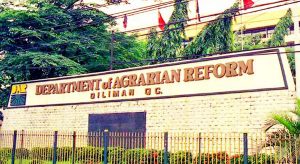THE GOVERNMENT has been asked to do more to help agrarian reform beneficiaries (ARBs) beyond debt condonation, with a peasant organization calling for continuing land distribution.
“While these may offer some relief to around 610,000 (ARBs), this is no substitute for a new, thoroughgoing, and redistributive agrarian reform program,” Danilo H. Ramos, national chairman of Kilusang Magbubukid ng Pilipinas, said in a Viber message.
Agrarian Reform Secretary Conrado M. Estrella III has said that President Ferdinand R. Marcos, Jr. — who is also the Secretary of Agriculture — will sign the New Agrarian Emancipation Act on July 7.
The House of Representatives passed House Bill No. 6336, its version of the measure, in December while the Senate approved Senate Bill No. 1850 in March.
Both chambers separately ratified the measures in bicameral conference and sent the report to the President before the legislative recess on March 25.
“The loans to be condoned are unpaid amortization, interest payments, surcharges, and penalties of existing loans of ARBs secured under CARP (Comprehensive Agrarian Reform Program) or other agrarian reform programs or laws,” he said on June 25.
Mr. Ramos said the government can “resolve the land problem” by pushing free land distribution, breaking monopolies, providing support services to ARBs, and building rural industry.
“Such a program addresses the peasantry’s historical plight for social justice, provide rural jobs and livelihoods, build food self-sufficiency, and protects the environment, among others,” he said.
Sonny A. Africa, executive director of think tank Ibon Foundation, said the pending measure is “long overdue.”
“The bill is important in partially correcting the long-standing problem that agrarian reform beneficiaries are burdened with amortization, but its benefits shouldn’t be overstated,” he told BusinessWorld in a Viber chat.
Mr. Africa said that most ARBs that are making debt payments may “not feel any practical difference” when the law passes as they are unable to pay to begin with.
“We recall how some 70-80% of ARBs on (Land Bank of the Philippines)-compensable land are considered non-paying or without payment yet with only the balance roughly equally distributed between partially paid and fully paid ARBs,” Mr. Africa said.
“For the fraction of farmers relieved of amortization but also for the many others who haven’t been able to pay anyway, the question remains what government support there really is in terms of making the land they till productive and food affordable for Filipinos,” he said.
He noted that the increase in the agriculture budget for 2023 “doesn’t seem to have been reflected in increased earnings for farmers nor cheaper food for consumers.”
Leonardo Q. Montemayor, a former agriculture secretary and chairman of the Federation of Free Farmers, said that the measure also needs to condone realty taxes.
“It’s good legislation for ARBs, who will each save an average of about P95,000 in payments of principal and interest/charges,” he said in a Viber message.
“I hope that a companion measure/law that will condone unpaid realty taxes and charges on land awarded to ARBs will also be forthcoming,” he added. — Sheldeen Joy Talavera

